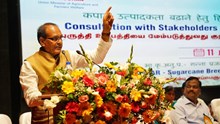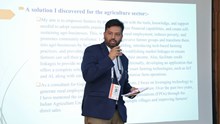
Punjab is the food bowl of India, not only does it meet its own food requirements but supplies food to other states also. Channan Singh Sran is one of these farmers doing the good work for the state and the country. He is based out of Tarn Taran Sahib district, tehsil Patti. He recently released his video on FTB platform and started by thanking Krishi Jagran, Punjab for this opportunity. He said he wanted to talk and discuss farming with you. He said many brothers had called him, questioned him and today all of them will be answered. The type of farming he does, and what he grows, his main crops, all will be revealed to the viewers.
The crops and his brand
Patti is his hometown where he has his farms where all his farming activities take place. He said Tarn Taran Sahib is on the border belt and there are no major mandis around to sell their produce. Most of the farmers work on the wheat (kanak) crop, due to this reason. He started with veggies farming in 2013, with carrots which is his main crop. He also grows turnips, cauliflowers and radishes which are his main winter crops. In summer he grows ladyfingers, bitter gourd, apple gourd, water melons and melons. Wheat (kanak) is the main business around where he lives but the farmers can grow veggies as a side business.
His brand name is "Sran Vegetable Farm", started in 2013. He is a member of the PAU (Punjab Agricultural University) Kisan Club and Organic club. He has been trained at the local KVK (Krishi Vigyan kendra) and stays in touch with Kheti Badi office at Patti.
Marketing issues
Next, he talks about the difficulties in marketing. He said we all know the rates that we will get at the mandis and that our produce may not be sold out. His products are not only sold at the local mandi but also at Pathankot, Jammu. He tries to sell his products wherever he gets favourable rates. His farms are next to the town and due to good quality he has regular customers, they have full faith in us and collect their veggies directly from the farm. He has a friend in the town, to whom he supplies his produce and he helps him in sales through his store which is accessible to the general public. He places his tractor, trolley next to the store and his fresh veggies are ready for sale.
He is also into organic farming, 5 acres of his land he has devoted to organic methods of farming. He again has direct customers for these and he always gets good price for organic veggies. He sells these at a reasonable rates and the buyers are always satisfied.

He grows wheat (kanak) like everyone else, some of it is grown organically. He grows desi basmati too, which is pure organic and certified by Punjab Agro and this product too has regular customers. We have to look after our winter and summer crops throughout their season. Although a wheat producer, he has slowly shifted to horticulture. He has planted pears over a farm of 5 acres. He suggests to his fellow farmers to diversify, not to leave wheat farming but to grow veggies and fruits alongside their existing crops. You may also grow mustard and instead of selling it raw, process it, produce oil out of it and then sell it for greater income. Establish your brand and sell your products under that brand name, like he has.

Plans for chemical-free future
His plan for the future is that he wants to work more with horticulture and raise more fruit gardens. In his fruit gardens he has planted plants by 25x25 pears, peaches and plums which bear fruits in 2 years. He always sells his fruits directly rather than through middlemen. If you sell through mandis you will be robbed. He says some of the customers are willing to pay in advance for organic produce.
He believes that the chemicals are ruining our land and our crops. Most of the diseases we suffer from are caused by these poisonous chemicals. Although you buy these crops cheap but you pay up in the hospital. Most of the crops are sprayed with chemicals to protect crops from pests and insects but these are harmful for human health. Organic food is expensive because of time and effort that is required but it is good for your health.
He also works with DSR, Direct Sowing Rice, which he started in 2013 on 2 acers. He faced problems initially in the first 2 years. In the first year he faced problems with weeds, and herbicides were not effective. So, he had to invest heavily in labour to manually pluck these weeds and unwanted shrubs. In the first year he had harvest of 2 quintals of rice and last year he directly sowed over 18 acres. He recommends DSR to his fellow farmers, whether they own 10, 20 or 30 acres of farms. He said main investment is in irrigation for this type of farming and labour is expensive nowadays. Not all of the soils are suitable for DSR, you must make sure that your fields have the right type of soil.
He finally gives his message to the farmers, he said that avoid chemicals as these are dangerous for farming and our health. These chemicals destroy the pH levels of our soil. You must grow products with green mark, not red and be careful with irrigation.



















Share your comments